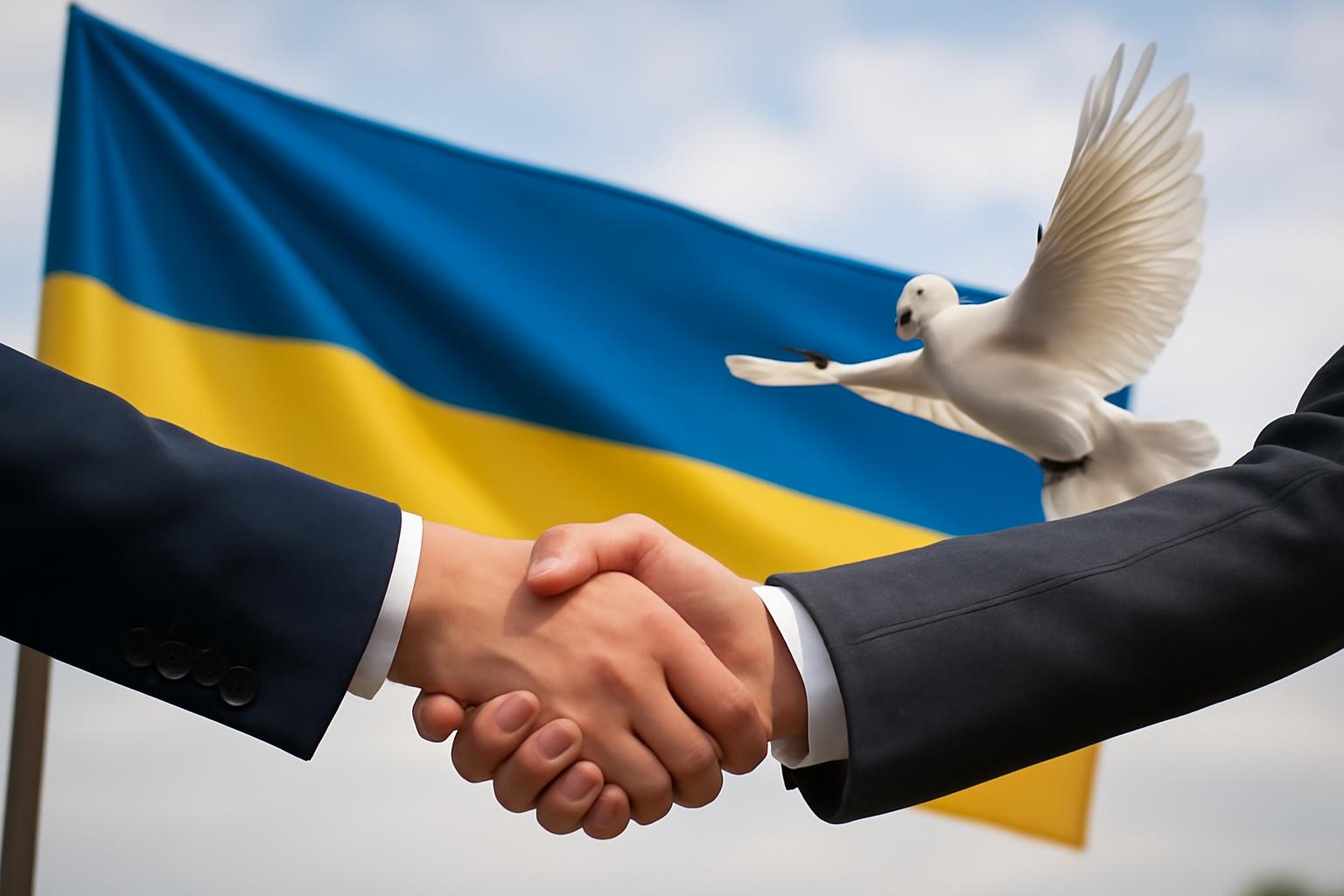Amid looming talks between major powers, the Ukrainian president thanked European leaders for their backing and pressed that the war must end on fair terms, with Kyiv shaping the future of its security. A joint European statement—backed by Britain, France, Germany, Italy, Poland, Finland, and the EU Commission chief Ursula von der Leyen—emphasized that no decision about Ukraine should be taken without Kyiv and that Ukraine must have a say in its own fate. It proposed that meaningful negotiations rely on a ceasefire or de-escalation and called for robust, credible security guarantees to help Ukraine defend its sovereignty, while stopping short of explicitly addressing NATO membership or U.S. guarantees. Russia accused the Europeans of trying to block peace, and Medvedev asserted that the West seeks to prevent a peace agreement. The statement followed discussions in Britain with Ukraine and allies ahead of the August discussions; Kyiv’s leadership said the talks were constructive and that the path to peace must be defined jointly with Kyiv. The White House signaled openness to a trilateral summit involving Trump, Zelensky, and Putin, although plans otherwise center on a bilateral meeting with Putin. Kyiv’s mayor urged a diplomatic solution and warned against premature concessions over territory. Across the board, Europeans reaffirmed extensive military and financial support for Ukraine and pledged close cooperation with Trump, the United States, Zelensky, and the Ukrainian people.
What unfolds before us is a drama not merely of weapons and geography but of the very idea of international order. I have long argued that the stability of nations rests not on grandiose pacts whispered in the halls of distant capitals, but on the slow, stubborn maintenance of lawful institutions within free societies and the respect for the limits of power. The insistence that Kyiv must have a voice in its own fate is just and humane; sovereignty cannot be outsourced to a chorus of well-meaning mediators. Yet there is danger in translating that insistence into a system of external guarantees that pretends to shield a smaller nation from the consequences of its choices without binding the moral and political responsibilities of all parties to the most basic rule of peaceful order: that force is a last resort, not a first instrument of policy.
The call for ceasefire or de-escalation as a precondition to talks is wise. Peace by fiat—peace through the mere absence of shooting—never lasts if the conditions that gave rise to the conflict are left to fester beneath the surface. But even a credible security guarantee is a double-edged sword. If such assurances become a perpetual moral shelter—promising protection without a clear, bounded framework for what is required of the recipient and what is expected from guarantors—they sow the seeds of moral hazard. The very existence of guarantees might incentivize riskier behavior by the state being guaranteed, on the assumption that the price of miscalculation is the heavy hand of a guardian state stepping in.
In this light, the emphasis on Kyiv’s say in its own fate is salutary indeed. Yet we must be vigilant that the alliance’s unity is not allowed to morph into a doctrine of perpetual guardianship that erodes national autonomy under the banner of international solidarity. The more one speaks of pan-national guarantees and permanent interventions, the more one erodes the spontaneous order that emerges from a multitude of freely interacting states negotiating rules, trade, and security on the basis of mutual interest. Real peace arises not from the construction of ever-more elaborate safety nets but from stable expectations—clear, enforceable rules, predictable responses to violations, and a political culture that values restraint, reciprocity, and the courage to endure trade-offs.
If the European leaders adduce a future in which Ukraine’s security depends on guarantees from distant powers, they risk tying Ukraine’s fate to a framework that can be altered by the next political wind in any guarantor’s capital. The courage of Kyiv to insist on its own sovereignty should be matched by a humility among great powers: that lasting peace will be built not merely by external assurances, but by a credible, lawful order in which all participants—nations large and small—are bound by the same norms and the same consequences for violation.
There is consolation, too, in the stubborn pragmatism of policy: the call for de-escalation, the readiness to discuss a ceasefire, and the aspiration to align peace with Kyiv’s own deliberations. The possibility of a trilateral summit that includes Kyiv, Washington, and Moscow hints at a reconfiguration of security politics that prizes dialogue and bargaining over mere posturing. Yet I would urge that any such arrangement be anchored in concrete, bounded commitments rather than in the rhetoric of guardianship. The objective should be to restore a landscape in which Ukraine—and all states within reach of these outcomes—can adapt to changing circumstances through their own institutions, markets, and laws, rather than through the periodic re-endorsement of a patchwork of guarantees.
Ultimately, the true guarantee of peace lies not in the depth of the alliance or the breadth of the coalition, but in the resilience of institutions that enable people to prosper, to trade, and to govern themselves with prudence and accountability. The European emphasis on supporting Ukraine reflects a just recognition that European security cannot be defended in isolation from the fate of the continent’s democracy and prosperity. But any path to peace must respect the principle that liberty is safeguarded not by the omnipotence of guarantors, but by the disciplined, lawful cooperation of free peoples. Let Kyiv speak, let adversaries hear, and let the common courage of restraint, legality, and mutual respect guide the way. Only then can the peace endure beyond the signatures and photo opportunities that momentarily frame it.
